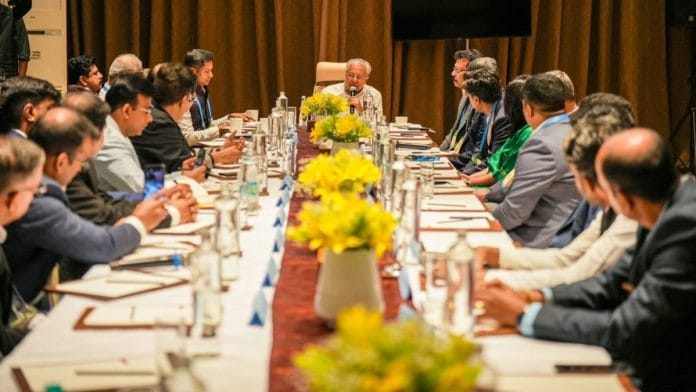Thiruvananthapuram: Pressing further with its plan to spur investment in the state, the LDF is in the process of implementing 21 policy reforms aimed at streamlining skill development, fast-tracking land-related approvals and doing awa y with procedural delays.
Hari Krishnan R., executive director of Kerala State Industrial Development Corporation (KSIDC), said the reforms were part of 31 policy recommendations made by investors and experts before and after the Invest Kerala Global Summit held in February.
Of these, 21 recommendations were approved in a high-level meeting chaired by CM Pinarayi Vijayan on 19 June, he told ThePrint.
According to the KSIDC, 21.38 percent of total investment commitments made at the Invest Kerala Global Summit have materialised.
Responding to an unstarred question in the assembly last month, Kerala industries minister P. Rajeev said 98 investment proposals “have so far been converted into actual investments”. As a result of these commitments being materialised, he said, “investments worth Rs 34,684.750 crore and 48,363 job opportunities are being created in the state”.
Expressions of Interest (EoI) worth Rs 1,52,905 crore were received at the summit held in Kochi on 21 and 22 February. The event was preceded by over 40 sector-specific conclaves held by the Vijayan-led Left Democratic Front (LDF) government, which is actively trying to position the state as an investment destination.
Explaining how the LDF is working to transform the proposals into actual investments, Hari Krishnan said, “All projects have one nodal officer. These officers accompany investors if they need to get clearance from any department. Projects above Rs 100 crore are directly overseen by the KSIDC, and others are followed up by the Directorate of Industries.”
He added that the state is helping investors if they require land or funding, adding that a dedicated portal named ‘LandConnect’ has been launched to bring landowners and investors together.
Hari Krishnan asserted that the inauguration of Vizhinjam seaport this May, as well as the proposed Kochi-Bengaluru industrial corridor, are expected to give a fillip to the investment landscape. “There is a perception that Kerala is not good for business. When there is a push from the state, that perception will change,” he said.
According to KSIDC officials, big-ticket projects in the works include a Rs 600-crore warehouse & logistics park in Ernakulam to be developed by the Adani Group, BPCL’s polypropylene manufacturing unit in Ernakulam, KGA International Trades Pvt Ltd’s commercial mall in Kottayam, and HiLite Group projects, including a shopping mall, JW Marriott Resort, World Trade Centre, and a Commercial Tower in Kozhikode.
Reforms under consideration
Policy reforms in the process of being implemented pertain to expediting conversion of agricultural land for investment proposals raised at the summit, setting up a dedicated body for processing applications, and streamlining procedures of the forest & wildlife department for fast processing of NOCs, permissions, and other relevant certificates.
The state government is also working on a plan to modernise technical education and strengthen industry-oriented skill development.
While 21 recommendations were approved, six await further discussion, three were not approved and one has been implemented. Recommendations under consideration include one which calls for amendments to the Kerala Land Reforms Act, 1963, to allow conversion of plantation lands for business or industrial purposes. Another calls for extension of lower power tariff, currently available to IT & ITES industries, to tourism and hospitality sectors.
The state has already implemented the recommendation aimed at creating a dedicated team in the local self-government department to track and follow up on EoIs received during the summit.
Kerala was once considered one of the most difficult states for businesses. As part of efforts to get rid of that image, the LDF in 2023 passed the Kerala Industrial Policy, prioritising 22 specific sectors, including aerospace, defence, AI and robotics.
Notably, the state cabinet has also approved a new Environmental, Social, and Governance (ESG) policy aimed at attracting environmentally friendly and low-polluting industries. The policy gives incentives to enterprises that align with ESG methodologies and global measures such as UN’s Sustainable Development Goals.
(Edited by Nida Fatima Siddiqui)
Also Read: In Kerala, summit to draw investors brings Left, Congress, BJP on the same team






